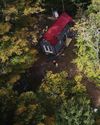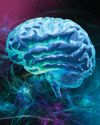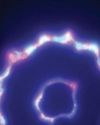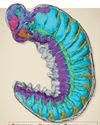
She resembles a little black ant, but the scientists gathered around her know better. She is an Anastatus orientalis wasp, our potential ally in the war against spotted lanternflies.
There's nothing in her glass jar except a piece of bark that looks like it's been smeared with spackle. Oblong shapes create hummocks beneath the coating.
The wasp lifts her head and drills down with her stinger, which can taste the living goo of the insect egg it pierces. If the taste is right, she will squeeze one of her own eggs inside.
The researchers will learn in a few weeks what she decided, when the egg's occupant emerges. If it's one of her offspring, that's another black mark for our alliance with her species-an alliance that's looking increasingly shaky.
Scientists hope to partner with A. orientalis because these wasps attack spotted lanternflies, invasive pests that are spreading across the country. Spotted lanternflies are killing grapevines, bombarding homeowners on their patios, and blackening gardens with their sticky feces. No one is sure what they'll do when they reach new areas such as California.
In their native range in China, spotted lanternflies rarely cause problems. They are kept in check by A. orientalis and another parasitic wasp called Dryinus sinicus, which is also being vetted as a potential pest-killing ally. If these wasps pass our tests, researchers will release them on American soil, sending them out to slay our lanternfly foes.
But in this sterile white room on a military base an hour southeast of Boston, the Anastatus wasp is not attacking the eggs of our enemy. Instead, she is piercing an egg laid by another type of lanternfly called Poblicia fuliginosa, which lives in winged sumac thickets in the southern U.S. If the Chinese wasps are released in the U.S., they will probably kill spotted lanternflies-but they might also kill these harmless native lanternflies and other American insects.
This story is from the {{IssueName}} edition of {{MagazineName}}.
Start your 7-day Magzter GOLD free trial to access thousands of curated premium stories, and 9,000+ magazines and newspapers.
Already a subscriber ? Sign In
This story is from the {{IssueName}} edition of {{MagazineName}}.
Start your 7-day Magzter GOLD free trial to access thousands of curated premium stories, and 9,000+ magazines and newspapers.
Already a subscriber? Sign In

ONE OF THE 'GREATEST THREATS' TO THE PACIFIC NORTHWEST ISN'T WHAT YOU THINK.
EXPERTS ARE PREPARING THE REGION AGAINST THE THREAT OF DANGEROUS VOLCANIC MUDFLOWS, KNOWN AS LAHARS, WHICH COULD INUNDATE THE COMMUNITIES SURROUNDING MT. RAINIER IN AS LITTLE AS 30 MINUTES.

THE WORLD'S TOUGHEST ROW
They rowed 3,000 miles across the Atlantic, battling unpredictable weather, chaotic seas, and finicky equipment. But what they discovered gave them profound new insights into the power of the ocean.

HOW TO DIY OFF-GRID SOLAR
SPEND THE TIME UP FRONT AND PLAN IT CAREFULLY TO AVOID DISAPPOINTMENT

Are We on the Verge of an ARMS RACE in SPACE?
RUMORS OF A RUSSIAN SPACE NUKE, ALONG WITH OTHER SATELLITE-TARGETING WEAPONS, HAVE MADE GEOPOLITICAL TENSIONS EXTEND INTO ORBIT.

Fresh Fingerprints on an Ancient Statue
A CLAY FIGURINE HAS SPENT MILLENNIA incomplete, waiting at the bottom of a lake for its long-dead craftsman to finish the Iron Age-era statuette.

Quantum Entanglement in Our Brains
IT HAS LONG BEEN ARGUED THAT THE human brain is similar to a computer. But in reality, that's selling the brain pretty short.

The Tools of Copernicus
WAY BACK IN 1508, WITH ONLY LIMited tools at his disposal, Nicolaus Copernicus developed a celestial model of a heliocentric planetary system, which he described in hist landmark work De revolutionibus orbium coelestium. It was a complete overhaul of our conception of the universe-one that, unfortunately, earned him the ire of the Catholic church for decades after his death-and forever changed the way we look at the stars.

Building a Sixth-Generation Bomber Raptor
THE GLOBAL COMBAT AIR Programme (GCAP)-a project by the U.K., Italy, and Japan to develop a sixth-generation stealth fighter-has been busy at the drawing board reshaping its vision of the future of air warfare. And judging by the new concept model unveiled at this year's Farnborough air show, that future has big triangular wings.

The Electroweak Force of the Early Universe
TODAY, THE UNIVERSE AS WE KNOW IT IS governed by four fundamental forces: the strong nuclear force, the weak nuclear force, electromagnetism, and gravity.

This Ancient Fossil With a Brain and Guts
WE KNOW WHAT FOSSILS LOOK like. For example, typical dinosaur fossils are bones turned to stone and preserved from the passage of time, located, if we're particularly lucky, in large collections that can be reassembled to represent the beast they used to prop up in their entirety.